
So, you've probably asked yourself at least once: can I use eggs in a gluten-free cake? If you're knee-deep in gluten-free baking, you know how tricky it can get. But here's the good part. Eggs are actually best buddies with gluten-free flours.
Now, let's break it down. Eggs are naturally gluten-free. That's right! You don't have to stress about them bringing gluten into your cake. They don't sneak anything bad into your batter. Instead, they're here to make your cake fluffier and tastier.
Why all the fuss, then? Well, there are myths floating around about eggs and gluten, so let's debunk those. Some folks think eggs have something to do with gluten because they work wonders in baking. But it's a bit like comparing apples to oranges.
- Understanding Gluten and Eggs
- The Role of Eggs in Baking
- Eggs and Gluten-Free Cakes
- Common Misconceptions
- Tips for Using Eggs in Gluten-Free Baking
- Delicious Gluten-Free Cake Ideas
Understanding Gluten and Eggs
Alright, let's clear up the basics. You've likely heard about gluten and eggs in the context of baking, but what's the real deal? First off, gluten is a protein found in wheat, barley, and rye. It's the stuff that gives bread its chewy texture by trapping gas bubbles during baking. If you're celiac or gluten-sensitive, you know this is the stuff you avoid like the plague. It can cause all sorts of unpleasant reactions.
On the flip side, eggs are a powerhouse in the baking world. They don't have gluten at all. So if you're worried about eggs adding gluten to a cake, breathe easy. They're naturally gluten-free. Eggs help provide structure, moisture, and richness to cakes. They act like glue, binding ingredients together. Without them, many cakes would just crumble into a sad, dry mess.
The Egg's Role in Baking
Let's dive a little deeper into why eggs matter so much. The whites of eggs are mostly just water and proteins, which, when whipped, can create a light, airy texture in cakes. Meanwhile, the yolks add color, flavor, and richness, thanks to their fat content. This is especially handy in gluten-free baking, where texture can be a bit iffy.
Crucial Egg Facts
- Eggs are nutrient-dense, filled with proteins, vitamins, and minerals.
- They help emulsify batter, making ingredients that don't naturally mix well do a happy dance together.
- Temperature matters: room temperature eggs blend better with other ingredients than cold ones.
If you're wondering about stats, interestingly, the average American eats about 279 eggs per year. While that's a lot, those in the baking world understand why so many eggs get cracked.
Next time you're whisking away, be assured that your eggs are not the bad guys in your delicious gluten-free cakes. In fact, they might just be your best ally in battling the challenges of gluten-free baking.
The Role of Eggs in Baking
So, what's the big deal about eggs when it comes to baking, especially in gluten-free cakes? Well, they do quite a bit of heavy lifting in your dessert world.
Structure and Fluffiness
First off, eggs are champions in giving structure. They help bind ingredients together, which is super important since gluten-free flours don't have that natural stickiness. You know that spongy texture you love in cakes? Yep, eggs make that happen.
Moisture and Richness
Let's not forget about moisture. Eggs add richness and moisture to your cake, making it a delightful experience rather than a crumbly mess. No one wants a cake that's dry, right?
Emulsification in Action
Oh, and there's emulsification. Fancy word, but it's simple. Eggs help mix fats like butter or oil with other ingredients. It’s like magic that makes batter smooth and even, ensuring that your flavors blend perfectly.
Leavening Agent
While you've heard of baking powder and baking soda, eggs are a natural leavener too. When beaten, they trap air pockets, helping your cake rise, which is perfect for light and airy cakes.
| Functions of Eggs | Description |
|---|---|
| Binding | Holds ingredients together |
| Moisture | Adds richness |
| Leavening | Helps cake rise |
| Emulsifying | Makes a smooth batter |
To sum up, those little eggs are the unsung heroes of many gluten-free baking recipes. Without them, you'd be missing out on the texture and flavor that make your cakes irresistible. So next time you crack an egg, remember the magic it brings to the table.
Eggs and Gluten-Free Cakes
Alright, let's talk about how eggs fit into your gluten-free cakes. First off, eggs are kind of like the superheroes in the baking world—they act as binders, providing structure that gluten typically gives in traditional cakes. This is especially important when you're using gluten-free flours that lack that gluey character.
Why Do We Need Eggs?
Eggs bring moisture and richness to your batter, making sure your gluten-free cakes don't taste like cardboard. They also help trap the air during baking, giving your cake a light and fluffy texture. Think of them as the backbone of your cake, holding everything together when gluten isn't invited to the party.
Still Worried About Eggs and Gluten?
Here's a reassuring fact: there's zero gluten in eggs. They’re naturally gluten-free, which means you can add them to your recipes without a second thought. Whether you're whipping up a basic vanilla cake or something fancier, eggs are the friendly sidekick you didn’t know you needed.
Some Handy Egg Tips:
- Room Temperature, Please: Make sure your eggs are at room temp. This helps them mix better and trap more air.
- Egg Substitutes: If you're also avoiding eggs, there are great options like apple sauce or flaxseeds, but remember, they can't exactly mimic what eggs do.
- Mind the Mixing: Over-mixing can deflate those egg whites. Mix just until combined for the best texture.
Want to see your egg-inclusive gluten-free cake shine? Try adding an extra egg white for even fluffier results. Or separate the yolks and whites, beating the whites first to fold gently into the batter. Your cake will rise to the occasion!
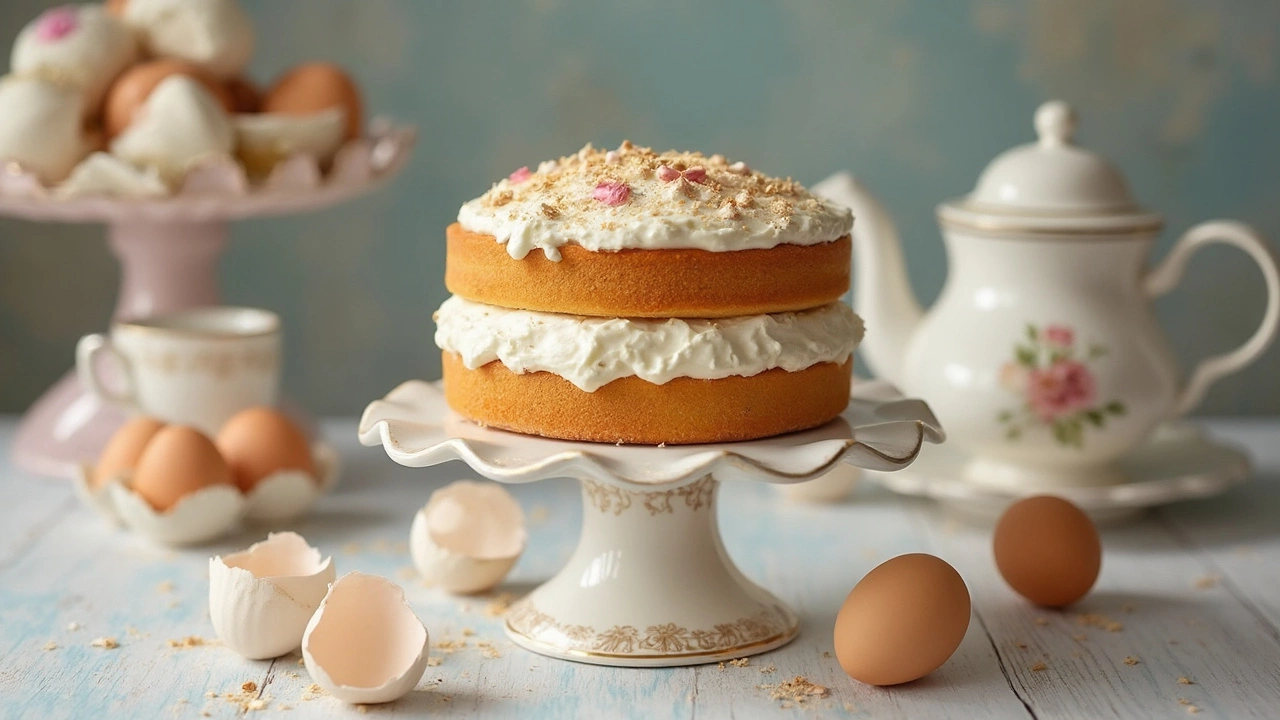
Common Misconceptions
You'd be surprised at how many myths are floating around about eggs in the world of gluten-free baking. Let's clear up some murky waters to make your cake endeavors a little less daunting.
Substituting Eggs and Gluten Confusion
The first misconception people have is that if one ingredient is changed to be gluten-free, everything else must follow suit. Commonly, folks think they need to replace eggs in gluten-free recipes, as if they're part of the gluten package. But guess what? Eggs are naturally gluten-free. You don't need to swap them out just to meet your gluten-free criteria.
Egg Allergies Versus Gluten Sensitivities
Another mix-up that happens often: people confuse egg allergies with gluten sensitivities or celiac disease. They aren't related, though sometimes eliminating both gluten and eggs from your diet happens for reasons other than gluten-consumed concerns. Both conditions are different, and understanding this helps us use ingredients effectively.
Eggs Ruin Gluten-Free Texture
This one's an old wives' tale. People think that using eggs in gluten-free cakes makes them dense or rubbery. In reality, eggs can be a secret weapon, adding moisture and lightness to otherwise dry flour mixtures. The right combination of eggs and gluten-free flour can make your cake the star of any dessert spread.
Myth Versus Reality: A Snapshot
| Misconception | Reality |
|---|---|
| Eggs contain gluten | Eggs are gluten-free |
| Eggs worsen texture | Eggs improve moisture and structure |
| Egg allergies imply gluten issues | Unrelated dietary concerns |
So, next time you're baking and scratching your head about whether to include eggs in your gluten-free cakes, remember these busted myths. Happy baking!
Tips for Using Eggs in Gluten-Free Baking
Here's the thing about eggs when baking gluten-free cakes. They aren't just 'another ingredient'; they're game-changers! Let's dig into some tips to make the most of them in your bake-off.
Pick the Right Size
The size of the egg can affect your cake's consistency. Generally, recipes assume you're using large eggs. Using too small or too big can mess with the moisture balance. Stick with large for predictable results.
Adding Moisture and Structure
Eggs help add moisture and structure, which is super important since gluten-free flours can sometimes be drier or crumblier. If your cake is feeling dry, a couple of extra egg yolks might do the trick without making things goopy.
Whisk It Right
Whisking eggs properly is key. A well-whisked egg brings in air, creating a lighter texture. If you're aiming for a fluffy sponge, don't skip on whisking those bad boys!
Egg Alternatives?
If eggs aren't your thing due to allergies or dietary choices, there are alternatives like flaxseed or chia seeds. They can work well but remember—they will give you a denser texture.
Balance is Key
Finding the right balance between your eggs and gluten-free flour matters. Too many eggs and your cake could taste eggy. Too few, and it'll fall apart. Stick to tested recipes or, if you're adventurous, tweak gradually until you find your sweet spot.
| Egg Size | Egg Ingredient Weight |
|---|---|
| Small | 38 grams |
| Medium | 44 grams |
| Large | 50 grams |
| Extra Large | 56 grams |
Perfecting the use of eggs in gluten-free baking can up your cake game. With a bit of experimentation, you'll whip up treats that are not only delicious but also beautifully textured.
Delicious Gluten-Free Cake Ideas
Ready to dive into some tasty gluten-free cake adventures? Whether you're baking for a birthday, a special occasion, or just because you feel like it, there are plenty of options that are both gluten-free and mouthwateringly good.
1. Almond Flour Chocolate Cake
Who doesn't love a classic chocolate cake? This one uses almond flour instead of the regular stuff, making it a rich and nutty delight. You'll also want to use eggs for that perfect rise and moisture. This cake is perfect for those who want a bit of indulgence without the gluten.
2. Lemon Drizzle Cake
If you prefer something refreshing, a lemon drizzle cake using a blend of almond flour and rice flour is the ticket. The mix of flours gives it a moist texture, and with the zesty lemon topping, it's hard to resist a second slice.
3. Carrot Cake
A perfect treat for any occasion, this gluten-free carrot cake mixes almond flour with gluten-free all-purpose flour. The eggs make the batter nice and fluffy, plus, it’s a great way to sneak in some veggies! Add some cream cheese frosting for extra deliciousness.
4. Flourless Peanut Butter Cake
Okay, this one's a bit different but hear me out. It doesn't use any flour at all, just peanut butter, eggs, and a few other ingredients. It's a protein-packed, gluten-free delight that combines sweet and savory in every bite.
| Cake | Main Ingredient |
|---|---|
| Almond Flour Chocolate Cake | Almond Flour |
| Lemon Drizzle Cake | Almond & Rice Flour |
| Carrot Cake | Almond & Gluten-Free All-Purpose Flour |
| Flourless Peanut Butter Cake | Peanut Butter |
You've Got Options!
So next time you think about baking, remember these gluten-free cake ideas. They each offer a different flavor and texture experience, catering to every taste bud out there. Using eggs in these recipes ensures your cake is not just gluten-free, but also moist and delicious every time.




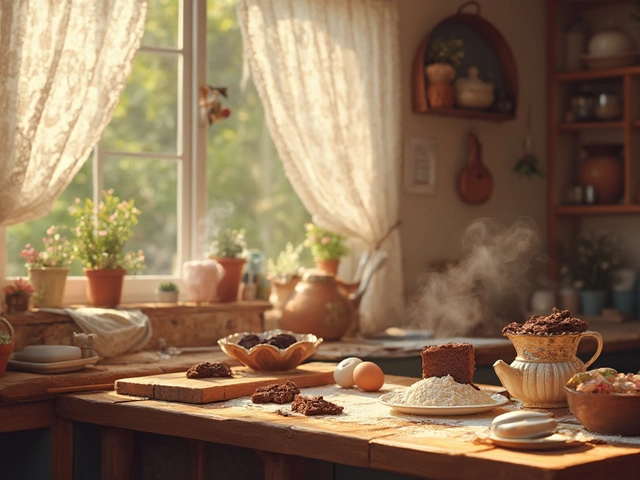


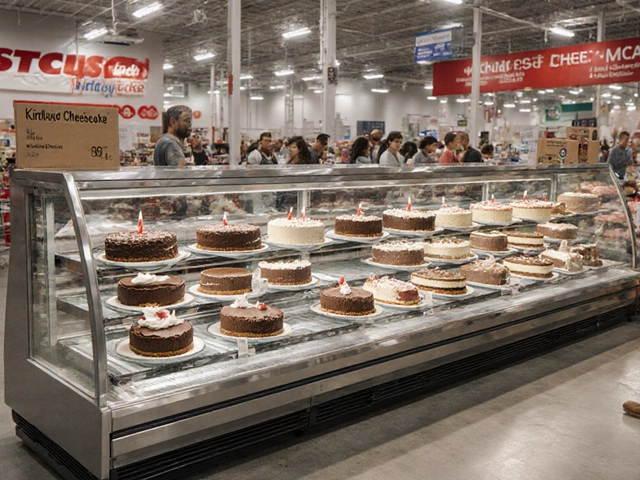
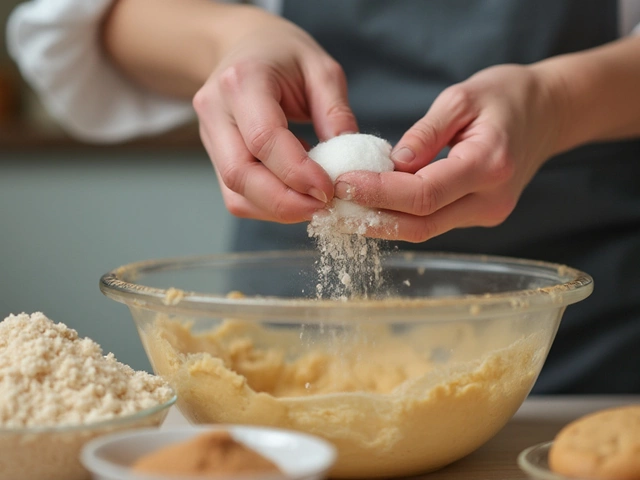
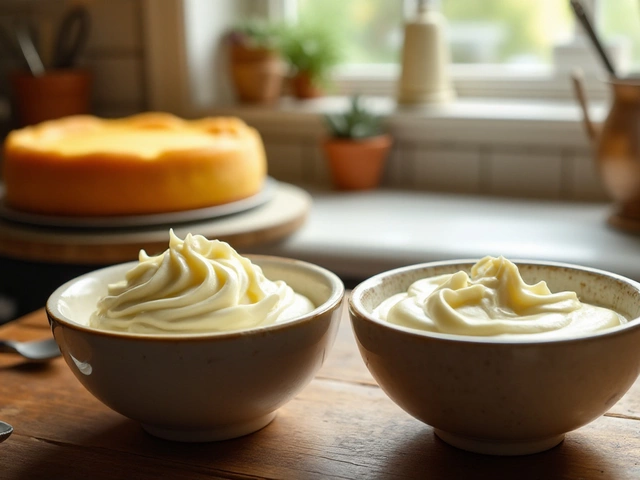

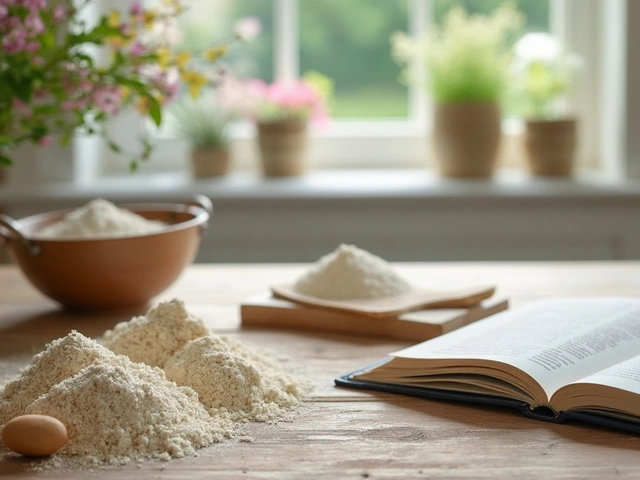
Write a comment